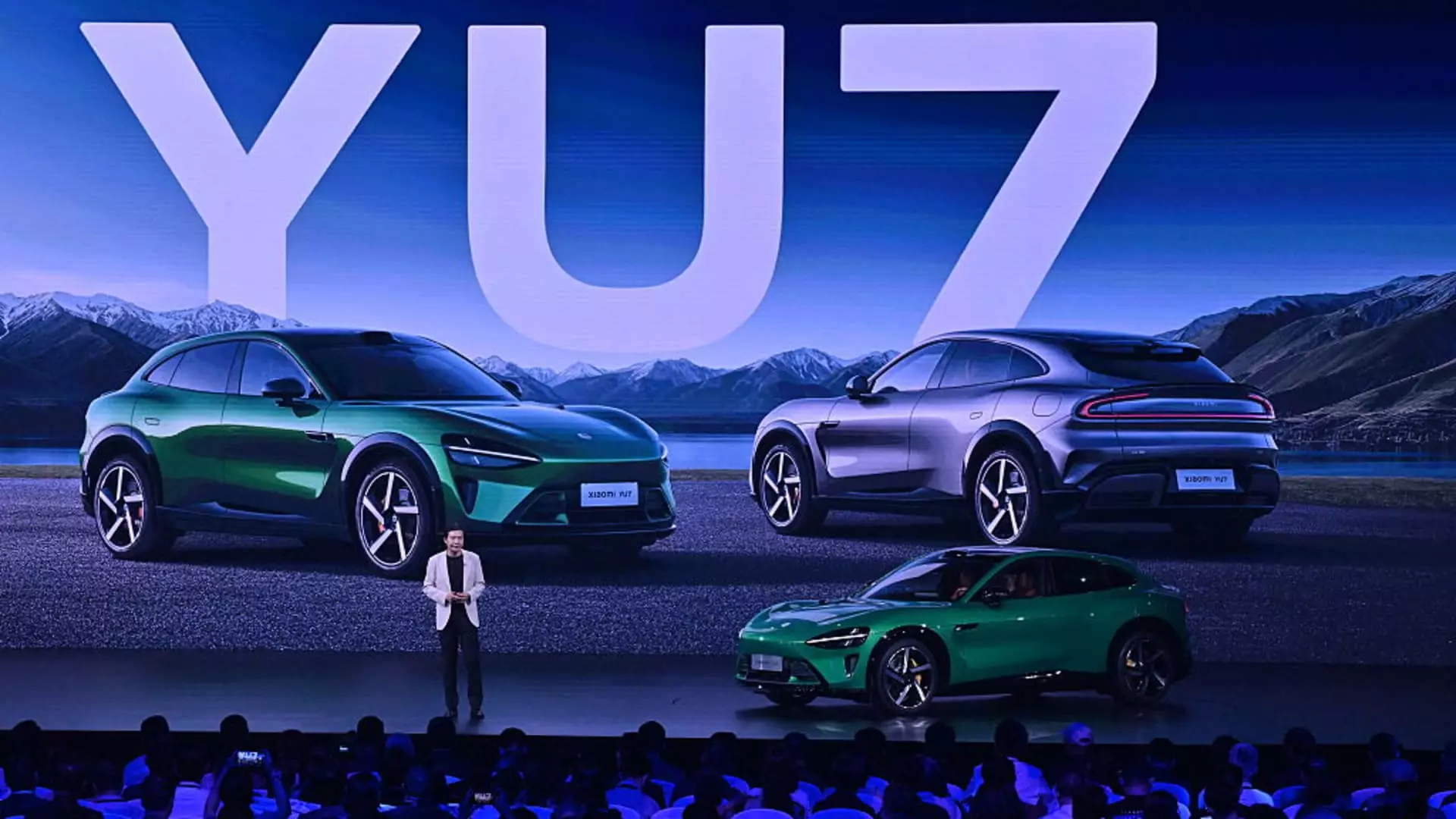Xiaomi, a giant in the smartphone industry, has recently ventured into the electric vehicle (EV) market, creating waves and anticipations among automotive enthusiasts and industry experts alike. With the release of its YU7 SUV, which boasts an impressive driving range of 760 kilometers (472 miles) per charge, Xiaomi is not just participating in the market but making a calculated strike against Tesla’s Model Y— a vehicle that has dominated Chinese roads since its inception. This lucrative challenge illustrates an evolving landscape in the EV sector, where innovation and consumer demands constantly reshape the competition.
Unprecedented Range: A Game Changer
The driving range of any electric vehicle is often the deciding factor for consumers cautious of battery life and frequent charging. Xiaomi’s assertion that the YU7 surpasses the Tesla Model Y’s 719 km range puts it in a favorable position from the get-go. Analysts, like Citi’s Jeff Chung, anticipate that this competitive edge may significantly carve into Tesla’s substantial market share in China. It raises a crucial question: could Xiaomi’s foray signal a shift in consumer loyalty, particularly among first-time EV buyers looking for practical yet premium options?
Pricing Strategies that Could Disrupt Market Dynamics
When discussing price, the YU7’s anticipated cost range of 250,000 to 320,000 yuan ($34,700 to $44,420) directly challenges Tesla’s price point for the Model Y, which starts at 263,500 yuan in China. With the current economic climate, where the average consumer might think twice before making significant financial commitments, Xiaomi’s pricing strategy comes off as astute. Analysts predict a potential monthly sales volume of 30,000 units, which could translate to an annual estimate of 300,000 to 360,000 units sold. This underlines that for Xiaomi, it’s not merely about entering the market but strategically positioning themselves to rival established giants head-on.
Analyzing Consumer Trends and Potential Risks
Despite the enticing prospects of their YU7 SUV, the backdrop of Xiaomi’s previous launch, the SU7 sedan, tells a cautionary tale. The SU7 has faced its hurdles, such as the unfortunate incident resulting in fatalities and subsequent scrutiny of driver-assist technology claims. Such errors may lead consumers to approach Xiaomi with skepticism when considering enhanced features in the YU7. The relationship between innovation and safety must be navigated carefully, and Xiaomi is now under increased pressure to reassure potential customers that they place utmost priority on safety standards.
The Narrative of Luxury in EVs
The YU7 is poised as a “luxury SUV,” a classification that raises eyebrows given that it directly competes against established brands. This ambitious categorization suggests that Xiaomi intends not only to sell vehicles but also to craft a lifestyle brand synonymous with sophistication and sustainability. However, there’s an intrinsic challenge in marketing a luxury identity within a marketplace increasingly flooded with budget options, such as BYD’s significantly cheaper models. Consumers may be more inclined toward affordable alternatives unless Xiaomi can convincingly articulate the tangible advantages that justifies the premium price tag.
Xiaomi: The ‘Apple’ of the EV Sector?
Interestingly, Xiaomi has established a reputation in tech innovation, often cited as a competitor to Apple in smartphones. The company’s recent unveiling of a top-tier phone at the YU7’s launch raised eyebrows and prompted speculation: how long until Xiaomi attempts to apply its smartphone marketing genius to the automotive sector? If Xiaomi can deliver on this promise while genuinely engaging consumers through technological prowess, such as seamless integration of software and hardware, it has a fighting chance to carve out a distinctive identity in the EV space.
The Road Ahead: A Clash of Titans?
With rivals like Xpeng also gearing up to launch competitive models, the EV market in China is primed for a showdown. The release of the YU7, coupled with ongoing shifts in consumer preferences, sets the stage for what could be one of the most exhilarating battles in automotive history. As companies like Xiaomi push the envelope, industry leaders might no longer be safe in their thrones, as innovations and strategic pricing quickly redefine who holds the advantage. The coming months will be pivotal—not just for Xiaomi but for the entire EV industry as it grapples with an era defined by consumer empowerment and fierce competition.

